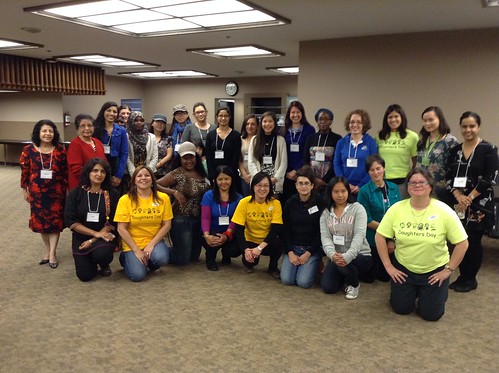
Together, Creating a Better World is the title of a handbook (written by long-time activist Jim Gurnett) and more recently, a workshop aimed at women who are new to community organizing. The event was organized by the same group responsible for
Daughters Day and took place on October 18 at the Stanley A. Milner branch of the Edmonton Public Library. Four women presented about different aspects of community organizing to close to 30 women from a variety of backgrounds. First, we heard about identifying a social issue and analyzing it. The next presenter spoke about mobilizing the community around a social issue. Then, we learned about organizing a good event on a social issue. I was the final presenter, and spoke about communications: how to effectively get the word out about an event or working group on a particular cause, and documenting events, with an emphasis on the use of social media. Below are my notes from the session, with the hope they will be of value to women and basically anyone who is new to activism and using the technology that is available to organize, promote, and document citizen engagement.
Introduction
About me:
Freelance communications professional who works in traditional and new media.
Activist, organizer in peace movement. With Edmonton Coalition Against War & Racism (ECAWAR).
For almost a decade been documenting the local activist community at RadicalCitizenMedia.com
Connect with me on Facebook (search my name - personal and music page); Twitter.
Why Social Media?
Traditional media still has its place: letters to the editor can be effective as well as placing free notices in listings in newspapers.
Social media more far-reaching to inform, document, and express concerning issues of social justice.
Benefits: Free (or low-cost); low learning curve; relatively simple.
Barriers: Not everyone can afford to have access to a computer or smartphone. Can be a classist issue. Not everyone is on social media - can be a generational thing where people are not as used to using a cell phone or computer. Lanaguge if English is not your first language.
Solutions: Libraries and some organizations have computers that are free to use. Even homeless people can sign up for an email account. You can post in your native language and reach people in your culture that way. Otherwise, your English does not have to be perfect and there is the opportunity to improve English by using it online.
Concerns: Privacy issues: don't post anything you would not feel comfortable with the whole world knowing. Don't post very personal details online. Corporate data mining - the price to pay for using a free service.
Smartphones can equal safety in activism: If something goes wrong, someone can photograph or film, and send to social media in real time.
Integrated Use
Overview of the use of Facebook, Twitter, Flickr, YouTube, Instagram
Hashtags: mark Tweets to make searches specific, eg. #yeg for Edmonton. Create a hashtag for your event, eg. #DD2014yeg for Daughters Day 2014.
Facebook events: invite friends, get them to invite friends, etc.
Free blogging sites: Wordpress, Blogger
RadicalCitizenMedia.com: links up photos and videos into a blog.
Post links to photo albums, events on Twitter.
You might want to have a communications subcommittee where someone photographs, and other films, another posts online, due to workload.
Success Stories
Occupy, Idle No More, and recent Palestine solidarity
Social media is becoming more accessible and commonly used.
Specific social media campaigns, like taking a selfie holding a sign with a message, and posting on Facebook or Twitter.
Discussion
How many of you are familiar with Twitter and Facebook?
Have you ever used social media to organize? If so, for what?
What concerns do you have about using social media?
Questions
This portion of the workshop was open to questions. Here are some of my comments in response to the excellent questions I was asked:
Documenting events can be beneficial if you seek future funding, as you have proof of your previous event and also provide the opportunity for sponsors to be recognized through your photos, etc.
If you are photographing a public event in a public space, you don't need direct consent from everyone in attendance to take pictures and post them. You can announce, as a courtesy, that you are filming/photographing and say if anyone has a problem with appearing in photos to let you know. Disclaimer: This is not legal advice. This is from my own experience and what I know of these situations.
No comments:
Post a Comment